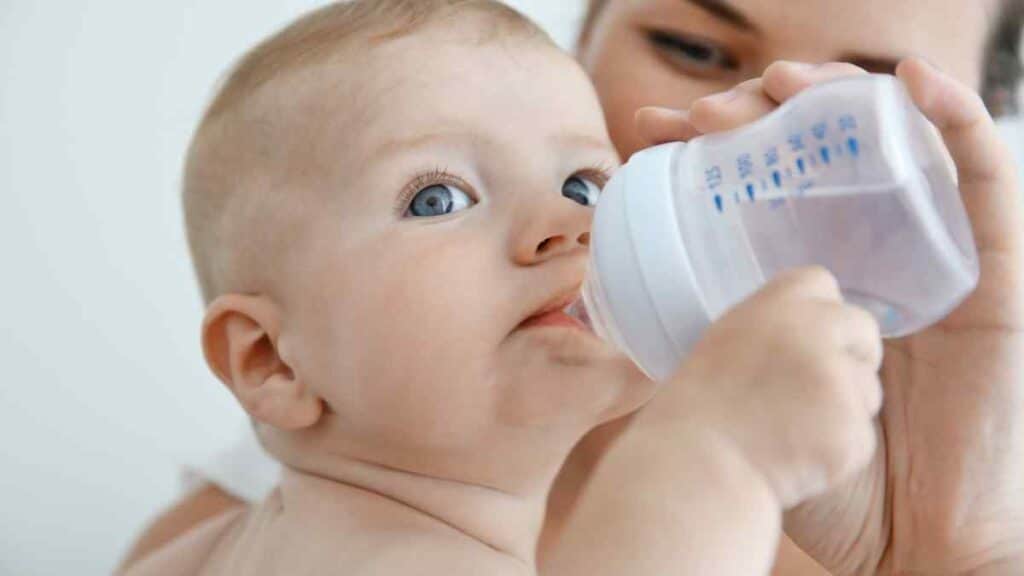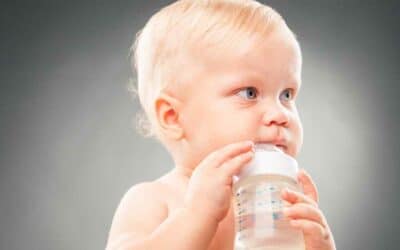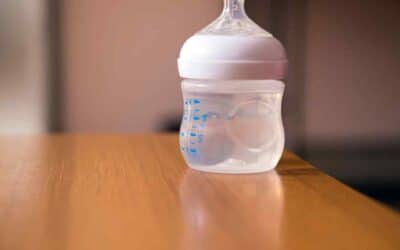Navigating the world of infant nutrition can be a complex and overwhelming journey for families, with numerous decisions to make and misconceptions to address. One such area of concern is distilled water for baby formula preparation. With varying opinions and conflicting information, it becomes crucial to separate fact from fiction to ensure the well-being of your little one.
This article aims to clarify this topic by debunking common myths and presenting accurate information supported by scientific evidence. By better understanding the role of distilled water in baby formula preparation, you can make informed decisions for your child’s nutrition and overall health.

What Is Distilled Water?
When preparing baby formula, one of the key components is the water used to mix the powder or concentrate. The quality and safety of this water can significantly impact your baby’s health and nutrition. Distilled water is a popular choice for many parents due to its unique purification process, which sets it apart from other types of water.
Distilled water is a type of purified water that undergoes a specific process called distillation [1]. This process involves boiling the water to produce steam, which is then collected and condensed back into liquid form. The distillation process effectively removes impurities, contaminants, and minerals in regular tap water, such as bacteria, viruses, heavy metals, and chemical pollutants, turning the water into its purest form. The result is water free from these unwanted substances, making it a safe and clean option for various applications, including baby formula preparation.
Role of Distilled Water in Baby Formula Preparation
When it comes to mixing baby formula, the quality of the water used is crucial. Contaminants or excessive minerals found in some water sources can pose risks to your baby’s health or impact the formula’s overall nutritional value. Distilled water offers several advantages in this context:
Safety
The distillation process effectively removes harmful contaminants, ensuring that the water used to prepare your baby’s formula is safe and free from potentially harmful substances [2].
Consistent Quality

Distilled water offers a consistent level of purity and quality, providing peace of mind and reliability when preparing your baby’s formula.
Neutral Taste
Distilled water’s lack of minerals and impurities results in a neutral taste that does not alter the flavor of the baby formula. This can be particularly beneficial if your baby is sensitive to taste changes.
Mineral Balance
Some water sources may contain high levels of minerals, such as calcium and sodium, which can affect the formula’s overall mineral balance. Distilled water ensures that your baby receives the precise nutritional content intended by the formula manufacturer.
While distilled water offers these benefits, it is essential to consult your pediatrician or healthcare professional before making any changes to your baby’s feeding routine. They can provide tailored advice based on your baby’s specific needs and local water quality.
Common Misconceptions about Distilled Water for Baby Formula
Having delved into the properties and roles of distilled water in powdered formula preparation, addressing some common misconceptions that may arise when considering its use is essential. Parents often encounter conflicting information, which can lead to confusion and uncertainty. In this column, titled “Common Misconceptions about Distilled Water for Baby Formula,” we aim to debunk these myths, providing accurate information and peace of mind as you make decisions about your baby’s nutrition.

Distilled Water Lacks Essential Minerals for Babies
One of the most common misconceptions is that distilled water lacks essential minerals that babies need for proper growth and development. While it is true that the distillation process removes minerals, it is essential to remember that powdered formula is already fortified with the necessary nutrients, including minerals, to support your baby’s health. The primary purpose of water in formula preparation is to act as a solvent, not a source of nutrition.
Distilled Water Is Too Acidic for Baby Formula
Another misconception is that distilled water is too acidic and can negatively impact the pH of the baby formula. In reality, distilled water has a neutral pH of 7, which makes it suitable for mixing with baby formula. The formula itself is designed to provide an appropriate pH level that meets your baby’s nutritional requirements.
All Types of Water Are Equally Safe for Baby Formula Preparation
Some people may believe that all types of water are equally safe for preparing baby formula. However, the safety of water can vary depending on the source, treatment methods, and potential contaminants. Distilled water offers a consistent level of purity due to its thorough distillation process, making it a reliable and safe option for baby formula preparation.
Boiling Tap Water Is Equivalent to Using Distilled Water
While boiling tap water can help kill certain bacteria and pathogens, it is not equivalent to using distilled water. Boiling does not remove all contaminants, such as heavy metals and chemical pollutants, which may still be present in tap water. On the other hand, distilled water undergoes a comprehensive purification process that effectively eliminates these impurities, ensuring a higher level of safety for your baby. So, there’s barely any need to boil distilled water at all.

Facts about Distilled Water for Baby Formula
In light of the common misconceptions surrounding distilled water for baby formula, it is crucial to present accurate information that allows parents to make informed decisions about their baby’s nutrition. In this column, titled “Facts about Distilled Water for Baby Formula,” we will address the truth behind these misconceptions and emphasize the advantages of using distilled water for preparing your little one’s formula. With a clear understanding of the facts, you can confidently choose the best type of water for making baby formula.
Distilled Water vs. Bottled Water
While some parents might consider low-fluoride bottled water an alternative to distilled water, it is essential to note that not all bottled water is created equal. Bottled water quality can vary significantly depending on the brand and source, with some containing high levels of minerals or even contaminants. On the other hand, distilled purified water consistently offers a high level of purity due to its thorough distillation process.
Nutrient Balance in Baby’s Formula
Contrary to the misconception that distilled water lacks essential minerals, it is vital to understand that baby formula is specifically designed to provide all the necessary nutrients for your baby’s growth and development. The formula powder already contains the required balance of dissolved minerals, and using distilled purified water ensures that the powdered formula’s mineral content remains unaltered during preparation.
Drinking Water Quality and Safety
While tap water is generally considered safe for drinking, its quality can vary depending on the location and water treatment facilities. In some cases, tap water might contain contaminants or excessive minerals, which can pose health risks or alter the nutritional content of the infant formula. Distilled water, due to its purification process, offers a consistently safe and high-quality drinking water option for preparing baby formula.
Boiling Water vs. Distilled Water
Boiling water can help eliminate certain bacteria and pathogens; however, it does not remove minerals or chemical pollutants that might be present in tap water. Distilled water, on the other hand, undergoes a comprehensive distillation process that effectively removes these impurities, ensuring a clean and pure bottled water source for making your baby’s formula.

Convenience and Ease of Use
Using distilled water to prepare infant formula can save time and effort compared to boiling water, which requires cooling down before mixing with the formula powder. Distilled water can be easily stored at room temperature and is ready to use whenever you need to mix infant formula milk.
Alternatives to Distilled Water for Prepared Formula
As we’ve explored the benefits of using distilled water in preparing baby formula, it’s important to note that other alternatives are available for parents who wish to ensure their little one’s safety and well-being. These options, like distilled water, focus on providing clean and pure water for mixing with baby formula. In this column, we will discuss the various alternatives to distilled water and the advantages each offers, helping you make an informed decision based on your specific needs and circumstances.
- Reverse Osmosis (RO) Water: Reverse osmosis is another purification method that effectively removes impurities, minerals, and other chemicals from water, making it safe for human consumption. In this process, water is forced through a semi-permeable membrane, which filters out contaminants and produces pure water. RO water is an excellent alternative for preparing baby formula, as it offers a similar level of purity to distilled water.
- Filtered Water: Filtered water is produced by running tap water through a filtration system designed to remove impurities such as chlorine, sediment, and some heavy metals. While not as pure as distilled or RO water, filtered water can still be a suitable option for preparing baby formula, provided that the filtration system is certified to remove contaminants effectively. Be sure to maintain and replace filters regularly to ensure optimal water quality.
- Boiled Tap Water: Boiling tap water is a simple and cost-effective method for making water safer for mixing with baby formula. By bringing tap water to a rolling boil for at least one minute, you can effectively eliminate most bacteria, viruses, and parasites that may be present. However, boiling water does not remove minerals or other chemicals, and its effectiveness depends on the quality of your local tap water. After boiling, allow the water to cool to body temperature before using it to prepare baby formula.

Conclusion
In conclusion, the use of distilled water for baby formula preparation is an important topic that warrants a thorough understanding of both misconceptions and facts. By debunking common myths and presenting accurate information, we hope to have provided clarity and guidance to help you make informed decisions for your baby’s nutrition and well-being.
While distilled water offers many benefits in terms of safety and purity, there are alternative options such as reverse osmosis water, filtered water, and boiled tap water, which can also be considered based on your unique circumstances and your baby’s specific needs.
Ultimately, consulting with your pediatrician or healthcare professional remains essential in ensuring the most appropriate and safe water source for your baby’s formula. Armed with this knowledge, you can confidently support your little one’s growth and development with the proper nutrition they need to thrive.
Did this article help you? We’d love to hear from you! Have a question about our site or your experience with us? Let us know in the comments.



